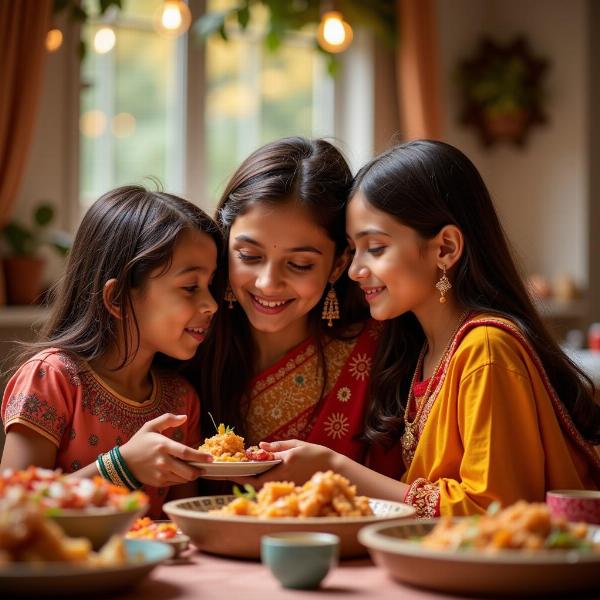Understanding how to say “She is my sister” in Hindi is crucial for anyone learning the language and wanting to connect with Indian culture. This seemingly simple phrase opens up a world of understanding about family relationships and the nuances of Hindi vocabulary. It’s not just about direct translation; it’s about choosing the right word that reflects the specific relationship and cultural context.
Different Ways to Say “She Is My Sister” in Hindi
Hindi offers several ways to express the concept of “sister,” depending on whether she is older or younger than you. This distinction is important in Indian culture, reflecting respect and familial hierarchy.
-
For an older sister: The most common term is “वह मेरी दीदी है” (vah meri didi hai). “दीदी” (didi) is a term of respect and affection for an older sister. It’s often used even outside the immediate family to address women older than oneself.
-
For a younger sister: You would say “वह मेरी बहन है” (vah meri bahan hai). “बहन” (bahan) is the general term for sister and is used when referring to a younger sister or when the age relationship isn’t relevant.
-
Another term for younger sister: You can also use “वह मेरी छोटी बहन है” (vah meri chhoti bahan hai), which literally translates to “She is my little sister.” This emphasizes her younger status.
 Indian Family Gathering
Indian Family Gathering
The Importance of Family in Indian Culture
Family ties are deeply ingrained in Indian society. Understanding the different terms for family members provides insight into these intricate relationships. Respect for elders, especially within the family, is paramount. Using the correct term for “sister” demonstrates not just language proficiency but also cultural sensitivity.
Beyond the Basics: Expanding Your Hindi Vocabulary
Learning the different terms for family members is a great starting point for expanding your Hindi vocabulary. You can build upon this foundation by learning other related terms, such as:
- भाई (bhai): Brother
- माँ (maa): Mother
- पिता (pita): Father
Learning these words will allow you to have richer conversations and connect more deeply with Hindi speakers. It demonstrates a genuine interest in the language and culture.
Delving Deeper into Cultural Nuances
While the direct translations are helpful, the true meaning of these terms goes beyond the dictionary. The way they are used in everyday conversation reflects the emotional connection and respect embedded in Indian family dynamics. For example, “didi” is often used with affection and reverence, highlighting the important role older sisters play in Indian families.
Why is it important to use the correct term?
Using the correct term demonstrates respect and understanding of Indian culture. It shows that you are making an effort to learn not just the language but also the cultural context in which it is spoken. This can help you build stronger relationships with Hindi speakers.
Conclusion
Learning how to say “she is my sister” in Hindi correctly opens a window into the rich tapestry of Indian family relationships and cultural values. Using the terms “didi” and “bahan” appropriately demonstrates not only linguistic proficiency but also cultural sensitivity and respect, fostering deeper connections with Hindi speakers. So, embrace these nuances and continue your journey of exploring the beautiful Hindi language.
FAQ
- What is the difference between “bahan” and “didi”? Bahan is the general term for sister, while didi is used specifically for older sisters and carries a connotation of respect.
- Can I use “bahan” for an older sister? While technically you can, it’s more respectful and culturally appropriate to use “didi.”
- How do I pronounce “didi” and “bahan”? “Didi” is pronounced dee-dee, and “bahan” is pronounced ba-hen.
- What are some other important family terms in Hindi? Some other important terms include “bhai” (brother), “maa” (mother), and “pita” (father).
- Why is family so important in Indian culture? Family is considered the cornerstone of Indian society, providing support, values, and a sense of belonging.
- Is it important to use the correct terms of address in Hindi? Yes, using the correct terms shows respect and understanding of Indian culture.
- Where can I learn more about Hindi language and culture? little sister meaning in hindi, second cousin meaning in hindi, and bhanji in hindi meaning are excellent resources.
Meaning-Hindi.in is your trusted partner for professional Hindi translation services. We specialize in business, legal, technical, website, educational, and certified document translation. Whether you need to translate a legal contract or localize your website for the Indian market, our expert team delivers accurate and culturally sensitive translations. Contact us today for a free quote. Email: [email protected], Phone: +91 11-4502-7584. Let Meaning-Hindi.in help you bridge the language gap and achieve your communication goals. deepawali meaning in hindi and paternal aunt meaning in hindi are just a few examples of our expertise.